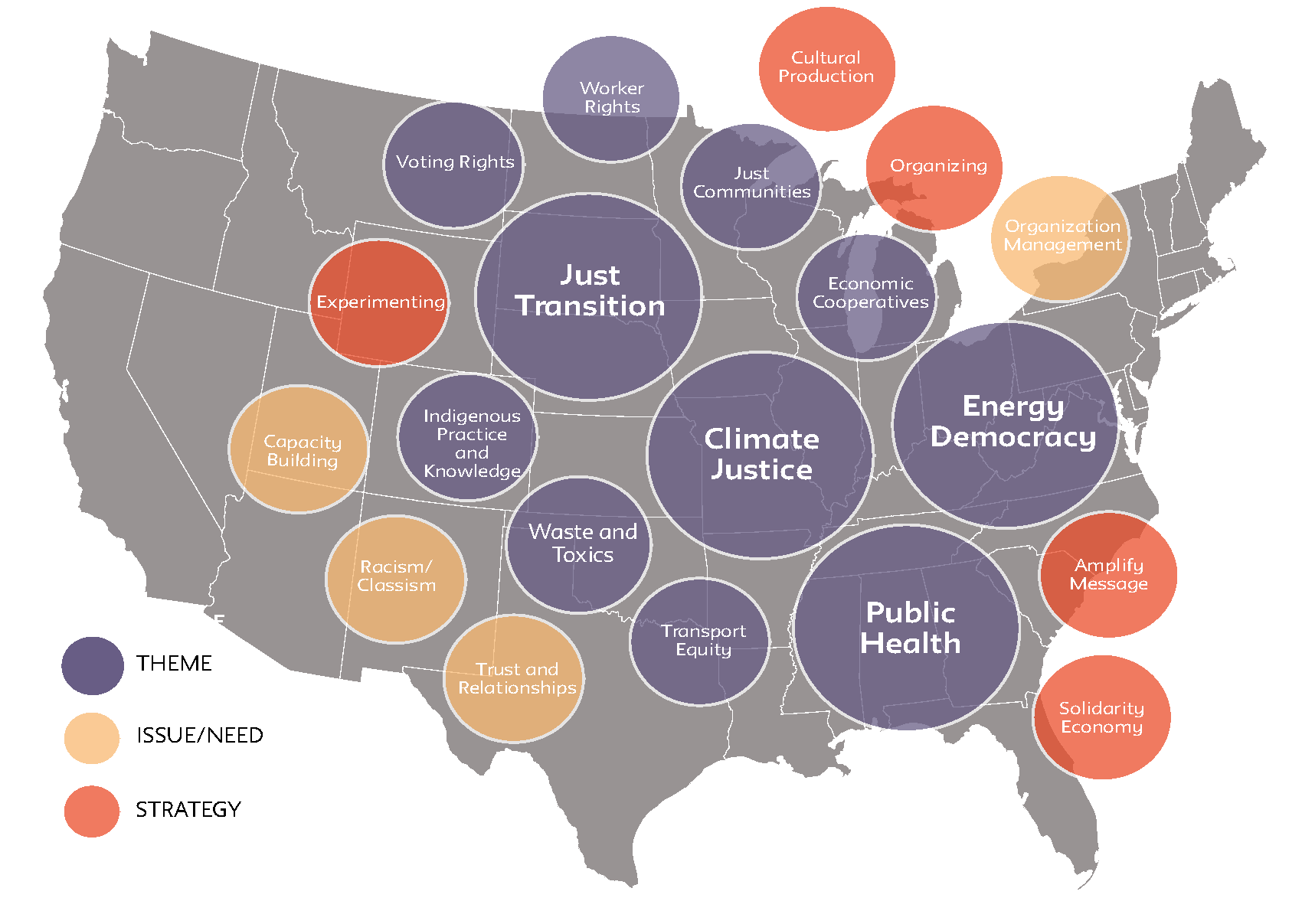Grassroots Leaders Collaborate with The New School in New Environmental Justice FellowshipNew fellowship designed for environmental justice leaders kicks off to develop disruptive, decolonized approaches to take on the climate crisis |
New York, February 2, 2021 -- In the wake of a historic year when the impacts of climate, race and economic crises are undeniable, The New School’s Tishman Environment and Design Center, in collaboration with the Social Movements + Innovation Lab, launched the Environmental Justice Movement Fellowship, to generate breakthrough solutions to the interconnected challenges of climate and racial injustice. The fellowship’s launch comes on the heels of a new federal administration, where all eyes are on how President Biden’s climate and environmental justice promises will play out in his first 100 days in office. While his recent action to pause drilling and fracking provides immediate triage, environmental justice leaders see some hope, but are looking for continued action from this administration to protect people from harmful air and water pollution, and increasing climate disasters. Grassroots organizers are looking for climate justice action that works for the people, not only corporate interests. The new two-year leadership program, developed with and for environmental justice grassroots leaders, comes at a critical time when grassroots organizing has influenced elections, shifted congressional power, and made strides in developing policy from the local to federal levels. The fellowship draws its purpose from the priorities and aspirations articulated by Environmental Justice Movement leaders during a 2019 assessment conducted by The New School to gain a deeper understanding of what would be supportive of their climate justice work. In the assessment, leaders highlighted their desire for more opportunities to creatively generate and iterate on approaches to their work, collaborate with other leaders, grow leadership skills, and scale impact. “To make change at the scope and scale that is necessary for our collective survival, we must invest in the movements that courageously break from the status quo and seek creative paths to build the new, more just world we want to live in,” said Angela Mahecha, the newly announced program director of the Environmental Justice Movement Fellowship. Mahecha is a leader in the Environmental Justice Movement with more than two decades experience working at the grassroots and global levels, and previously served as the first Latinx executive director of the Climate Justice Alliance. “We must invest in the leadership of the frontlines and support their vision. That time is now. I’m so excited to build the kind of program the Movement has been asking for." Leaders who have been on the frontlines of multiple crises shared the timely need for a space to protype, reflect, and share the learnings of decades of environmental justice work with new generations of activists, and to map the future of environmental justice organizing. “The current economic, social, and political turmoil is a moment of great risk and opportunity, where society can either retrench into business as usual or seize the chance to radically reimagine the world,” said Miya Yoshitani, executive director of the Asian Pacific Environmental Network, an organization with 30 years of environmental justice organizing in California and across movements.“To achieve the new, just world we want, those closest to the issues need to lead. There is tremendous potential in dismantling the barriers between movement expertise and academia that could change what is possible for us and future generations.” In 2020, movement leaders gathered in a series of conversations and workshops with The New School called Radical Reimaginations for Climate Justice to further explore movement building, strategies for advancing climate justice, and potential focus areas for the fellowship. Collaboration with the Environmental Justice Movement will continue during the pilot of the fellowship, where fellows from around the country and Turtle Island will act as codesigners of the program. “Relationships are at the root of everything we do in the Environmental Justice Movement. To be in a space where we’re able to be vulnerable, learn, and share culture, strategies, joy, and failures with one another – that is what true partnership and movement building looks like,” said Monica Atkins, organizing director at the Climate Justice Alliance. Atkins participated in the Radical Reimaginations for Climate Justice series, where she spoke about the role of cultural organizing in movement building. “The Environmental Justice Movement’s cross-issue approach, political base-building, and analysis of root causes makes the movement a powerful force for change. However, less than 1 percent of current environmental philanthropic funding goes to the Environmental Justice Movement and a similar percent goes towards leadership development,” said Kate Sinding Daly, executive director of the NorthLight Foundation, the lead funder of the fellowship. “These are the types of initiatives the philanthropic sector exists to support, but it doesn’t do so sufficiently.” The Environmental Justice Movement Fellowship aims to reverse this philanthropic trend by committing to long-term relationship building and collaboration between The New School, grassroot leaders, and philanthropic partners. “This is how philanthropy can work alongside movement partners, to create the space for breakthrough approaches created by those closest to the issues. These are the transformative solutions we need and we can’t build a movement if we are not investing in the infrastructure to support its leaders,” said Anna Loizeaux, environment program officer at The JPB Foundation. The NorthLight Foundation seed funded the fellowship in 2019 and The JPB Foundation joined the effort in 2020. Along with Angela Mahecha, the co-founders of the fellowship, Dr. Ana Baptista and Dr. Sujatha Jesudason, bring combined decades of experience in the Environmental Justice Movement and designing and leading innovative leadership development programs for social justice activists. “The New School was founded 100 years ago on the premise that scholars, academics and students should question, debate and discuss the most important issues of our time. Given the current crisis, we can’t continue with business-as-usual,” said Dr. Sujatha Jesudason, co-founder of the fellowship and founder of Social Movements + Innovation Lab. “We need more creative approaches to challenging and changing the status quo. Core to this fellowship is asking ourselves, what could we be doing differently or what different things could we be doing to change our current trajectory?” “Investing in the leadership of the Environmental Justice Movement is a non-negotiable. The Tishman Center has been a home base for environmental justice research partnerships, and we’re excited to now be able to contribute to a generative space that supports a resilient movement,” said Dr. Ana Baptista, co-founder of the fellowship and associate director of the Tishman Environment and Design Center. “By decolonizing our work and ourselves, we can build the trust and relationships that are foundational to scale more contentious and visionary approaches to climate justice.” For more information about the Environmental Justice Movement Fellowship, the analysis of Environmental Justice Movement leadership priorities, and recordings of the Radical Reimaginations Sessions which helped develop the fellowship, visit www.tishmancenter.org/ejfellowship. More from the Environmental Justice Movement Fellowship collaborators and innovators: “Indigenous people have the solutions and the traditional ecological knowledge to address climate justice. There needs to be a paradigm shift from the white patriarchal dominion that has been misusing and mismanaging our water and our cultural resources for far too long. We must shift to an indigenous worldview in order for us to create solutions and mitigate climate change.” - Julia Bernal, Alliance Director, Pueblo Action Alliance “Replication isn’t the goal when environmental leaders collaborate. Rather, what we’re creating together are groundbreaking solutions that are unique to the communities we come from. There is so much that can be learned from other leaders in a space like this fellowship, while at the same time staying accountable to our home bases.” - Melissa Miles, Executive Director, New Jersey Environmental Justice Alliance "I think there is a transformation that happens when we take care of each other. We’re building a healthy movement with sustained relationships and building a vision of a just future together. I believe that one of the great tools of capitalism is separating us from our neighbors and taking away our humanity. An organized community is powerful. When we embrace all oppressed people's issues, learn each other's stories, and stand together - that's where the power is." - Maria Lopez-Nuñez, Deputy Director, Organizing and Advocacy, Ironbound Community Corporation "The climate justice movement is both deeply local and deeply global by nature. Our struggles are bound to one another as frontline communities impacted by extractivism around the world. Grassroots organizations are the essential vehicles that allow us to learn lessons, build trust, and be in direct relationships with each other in the local communities where we are rooted and as we build shared struggle for justice at a global level." - Jaron Browne, Organizing Director, Grassroots Global Justice Alliance "Status quo philanthropy needs to be disrupted. We need to challenge ourselves to be about what equity really means, which is leveling the playing field. To do this effectively, we need to over invest where we've historically underinvested. This also means acknowledging the transformative change that environmental justice organizations have been able to make with minimal resources. It's been all possible due to people-power. Imagine if we resourced these organizations to win." - Gloria Walton, President & CEO, The Solutions Project "Culture and narrative shifting work are vital to changing people’s mindsets. People seeing themselves as a part of the narrative and as being a part of the solution is crucial for impactful, just solutions. We always want to move towards a place of supporting people in their power.” |
|
The Tishman Environment and Design Center, as part of The New School, is a university-wide center committed to fostering the integration of bold design, policy, and social justice approaches to environmental issues to advance just and sustainable outcomes. Following the Jemez Principles for Democratic Organizing, the Tishman Center serves as a hub for climate and environmental justice research and practice, with a specific focus on critical, participatory action-based research produced in collaboration with frontline, grassroots and community based organizations and coalitions. Through our collaborative efforts, we impact research, practice and policy. Social Movements + Innovation Lab provides space and tools for social justice leaders to explore and experiment with new and innovative ways to address some of society’s most entrenched problems of inequality and repression. Using creative and intersectional approaches to design and innovation, it supports leaders with fresh approaches to generating new ideas, approaches, tactics, and strategies to bring us closer to dismantling toxic and unequal systems and structures. Founded in 1919, The New School was established to advance academic freedom, tolerance, and experimentation. A century later, The New School remains at the forefront of innovation in higher education, inspiring more than 10,000 undergraduate and graduate students to challenge the status quo in design and the social sciences, liberal arts, management, the arts, and media. The university welcomes thousands of adult learners annually for continuing education courses and public programs that encourage open discourse and social engagement. Through our online learning portals, research institutes, and international partnerships, The New School maintains a global presence.
|
 |
MARKETING AND COMMUNICATION |
| 79 Fifth Avenue New York, NY 10003 www.newschool.edu |
PRESS RELEASE |
Media Contacts: The New School |
|
|
